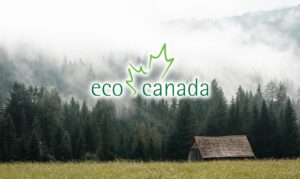Yellowknife is a small city with a big heart. With a population of just under 20,000, the city is a diverse place where people seem to come for a job but stay for the beauty and untamed nature of the Northwest Territories.
Whether the locals arrived from elsewhere to work or hail from NWT’s many Indigenous communities, they all share a strong connection with the land.

During our trip north for the Geosciences Forum we had a chance to learn about life on the land at the Prince of Wales Northern Heritage Centre. The beautiful artifacts and displays represent the reality of surviving long winters and short days, yet surprisingly, many traditional ways of life remain unchanged. The instruments and tools used for hunting and preparing animals are much the same today as they were 500 years ago or more. In downtown Yellowknife, it’s as common to see someone wearing traditional sealskin mittens as it is to find a young professional leaving the office in a Canada Goose parka.
While at the conference, we had the chance to speak with people who live and work in NWT and naturally, a popular topic was environment impact on northern communities. There was a lot of interest in and awareness of our BEAHR training programs for Indigenous communities. The programs combine environmental skills training with traditional knowledge to build a work-ready labour pool in communities across Canada. Many people agreed that capacity building within Indigenous communities is important. Creating lasting and long-term opportunities for individuals near the community is a goal to ensure that skilled workers do not leave the community in search of better work opportunities.
Having access to a trained workforce in the area encourages local hiring action from companies bringing in projects. Many are willing to commit to providing training or hosting training programs to ensure that their workers are able to work in a safe and appropriate manner. Hiring from the local communities is often mandated in their contracts and having access to a trained and eager workforce makes this much easier and benefits both the contractor and the community.
In addition to the interest about BEAHR programs, we have recently completed programs across the Northwest Territories including those in:
Lutsel K’e
In mid November, Blyth & Bathe Inc. delivered the Environmental Core and Environmental Monitoring Research Specialization Program to the Lutsel K’e Dene First Nation in Lustel K’e, Northwest Territories. Blyth & Bathe partnered with the LKDFN Wildlife, Lands, and Environment division to deliver the program to 12 students from the community. The students receive an introduction to the environmental sector as well as develop environmental research skills such as surveying and sampling techniques.
Yellowknife
In the beginning of November, Canada North Environmental completed the Environmental Core Modules with the Yellowknife Dene First Nation in N’Dilo, Northwest Territories. Nine students graduated and have now completed the pre-requisite for four of ECO Canada’s BEAHR’s Workforce Training Programs. Students gained foundation skills in the environmental sector including technical skills and integration of local knowledge.
The NWT Geosciences Forum brought together a mix of mining industry, environmental consultants, service industry, as well as local artisans. There was an overall sense of community within the companies that are based out of Yellowknife, and a prevailing spirit of working collaboratively, including within the various government departments that we spoke to.
Yellowknife locals were optimistic about hiring opportunities and industry operations after a slight economic downturn in the previous year. A few people mentioned they felt that the Yukon was where a lot more future work would be given that some newer, larger mines are opening there. ECO Canada has licensed BEAHR trainers with the Yukon Mining Company and we will have opportunities to host BEAHR training programs in the Yukon in the near future.
Given that ECO Canada is a national not-for-profit focused on training and certifying Canada’s environmental professionals, we have been focusing more efforts on providing training to our neighbours in the northern territories. One of the benefits of BEAHR is that programs are delivered right within the community, and we continue to offer these programs through our network of qualified, licensed trainers across the country from coast-to-coast.
To learn more about BEAHR training programs please contact beahr@eco.ca or head over to our website for more information.



